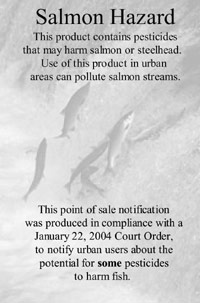Saving salmon through your local garden center
by Erika Schreder
This article was originally published in June 2008

Download the signs (PDF) from Washington Toxics Coalition.
(June 2008) — Next time you visit your local garden center or home improvement store, you can do something very simple that would help protect our native salmon. Take a look around the pesticide section and make sure the store has posted signs identifying certain pesticides as hazardous to salmon.
What kind of sign? Look for a “Salmon Hazard” warning sign required by a federal court order that says some pesticides being sold are harmful to federally protected salmon.
You may have a hard time finding the warning signs. Stores up and down the west coast received them from the U.S. Environmental Protection Agency (EPA) in July 2006, with instructions to post them next to any product containing one of seven common pesticides. But the EPA has failed to ensure all stores are 1) supplied with the signs, 2) know how to post them, and 3) re-post them with seasonal changes in product placement.
The required warning resulted from a January 2003 federal court ruling that established streamside no-spray zones for 38 pesticides. The court also ordered the consumer warning signs to reduce pesticide runoff in urban areas, where storm water systems carry pesticides from lawns and gardens to streams and rivers miles away.
Since the EPA isn’t making sure stores are posting the signs, concerned individuals can help do the watch-dogging. Check your local nursery, home improvement warehouse, or hardware store and see whether Salmon Hazard signs are posted at the designated pesticides.
If the signs aren’t posted, talk to the store manager and inform him or her that the signs are required by federal law and that they’ll help guide customers toward products less likely to harm salmon. If the manager is receptive, provide him or her with information on the pesticides that require the warning and how to obtain the signs.
Use the sample letters provided as a guide. Get the signs from www.watoxics.org (under Issues/Salmon protection lawsuit/How retailers can protect salmon). Download the signs here (PDF).
One interesting development: Home Depot stores in Canada are phasing out toxic pesticides (See Newsbites, Sound Consumer June 2008). But until the day comes when we can walk through aisles of safe, effective alternatives at Home Depot and other stores in the United States, we can help others make better choices.
These warning signs have incredible potential for educating homeowners about the need to switch to gardening methods and products that don’t poison salmon and threaten our children’s health.
| Pesticide name | Common product names |
Type of pesticide | Example of concerns to salmon |
|---|---|---|---|
| carbaryl | Sevin | insecticide | Reduces egg production and fertilization; reduces wimming and speed in fish. |
| 2,4-D | Found in weed and feed products | herbicide | Disrupts sex hormones of fish |
| diazinon | Diazinon | Insecticide | Reduces sperm production in male salmon |
| diuron | Karmex, Direx | herbicide | Reduces growth of aquatic plants and chlorophyll production |
| malathion | 50% Malathion Spray and Home Orchard Spray |
insecticide | Deforms spines; disrupts temperature selection in fish |
| triclopyr BEE | Crossbow and Brush-B-Gone |
herbicide | Increases respiration rates; flared gills; disoriented swimming behavior in fish. |
| trifluralin | Gordon’s Weed Preventer Granules | herbicide | Highly toxic to fish; causes skeletal abnormalities. |
